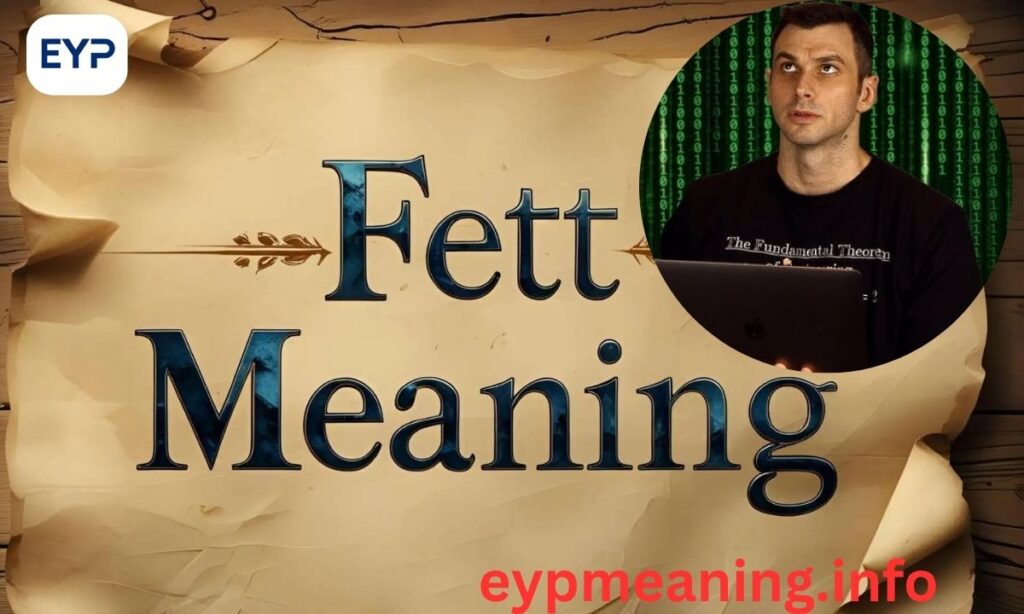Understanding the meaning of “fett” requires exploring multiple linguistic and cultural dimensions. This word carries different interpretations across languages and contexts. The German origin of “fett” provides the foundation for its primary usage.
However, pop culture references have expanded its recognition globally. This comprehensive guide examines every aspect of this fascinating term.
Definition & Core Meaning of Fett
The word “fett” primarily functions as a German adjective meaning “fat” or “greasy”. In its most literal sense, it describes something containing or covered with fat. The term applies to food, materials, and even metaphorical situations. German speakers use this word daily in various conversations.
Beyond its basic definition, “fett” has evolved into slang terminology among younger generations. In modern German youth culture, calling something “fett” means it’s cool, awesome, or impressive. This colloquial usage represents a complete semantic shift from the original meaning. The transformation demonstrates how language adapts to contemporary social dynamics.
The dual nature of this word creates interesting communication scenarios. Context determines whether someone describes physical properties or expresses enthusiasm. Native speakers instinctively understand these distinctions through tone and situation. Non-native learners often find this duality challenging initially.
Fett Meaning in German 🇩🇪
In German language, “fett” serves multiple grammatical functions. As an adjective, it modifies nouns to indicate high fat content or oily texture. German cuisine frequently employs this descriptor for traditional dishes. “Fettes Essen” translates to “fatty food” in English.
The word also functions as a noun when capitalized as “das Fett”. This noun form specifically refers to fat as a substance. Cooking contexts often require this distinction. Germans might discuss “tierisches Fett” (animal fat) or “pflanzliches Fett” (vegetable fat).
Modern slang usage has given “fett” an entirely different dimension. Young Germans exclaim “Das ist fett!” to express excitement about something impressive. This usage parallels English expressions like “that’s sick” or “that’s dope.” The positive connotation contradicts the typically negative associations with fatness. Urban communities particularly embrace this contemporary interpretation.
Key German Uses:
- Literal: Describing food with high fat content
- Slang: Expressing approval or amazement
- Technical: Referring to lipids in scientific contexts
- Typography: Bold or thick text styling
Etymology & Historical Background
The etymological roots of “fett” trace back to Old High German “feizit”. This ancient form emerged during the 8th to 11th centuries. Germanic languages share common ancestry for words describing fat and grease. The Proto-Germanic form “faitida- contributed to various modern terms.
Historical usage of “fett” remained strictly literal for centuries. Medieval German texts employed the word exclusively for physical descriptions. Agricultural and culinary documents referenced fat content regularly. The Industrial Revolution introduced new contexts involving machinery and lubrication.
The 20th century witnessed gradual semantic expansion. Youth movements in post-war Germany began experimenting with language. By the 1980s and 1990s, “fett” had acquired positive slang meanings. Hip-hop culture and urban communities accelerated this transformation. Today’s usage reflects decades of linguistic evolution.
Linguistic scholars note that semantic amelioration rarely occurs with words related to fatness. The positive reinterpretation of “fett” represents an unusual linguistic phenomenon. This counter-intuitive development challenges traditional assumptions about word evolution.
Popular Cultural References
Boba Fett remains the most internationally recognized bearer of this name. The iconic Star Wars character debuted in 1980’s “The Empire Strikes Back.” Creator George Lucas chose this surname for the Mandalorian bounty hunter. The name’s intimidating sound complemented the character’s menacing presence.
The Fett family in Star Wars expanded with Jango Fett’s introduction. The 2002 film “Attack of the Clones” revealed Boba’s origins. These characters have appeared in multiple series, films, and animated productions. Their cultural impact extends far beyond their screen time.
German media occasionally plays with the dual meaning of “fett” in entertainment. Music videos and advertisements leverage the slang interpretation creatively. Rapper names and band titles sometimes incorporate this word strategically. The versatility of the term makes it appealing for branding.
International audiences often discover the German meaning after encountering Star Wars. This reverse linguistic journey creates interesting cultural exchanges. Fans debate whether Lucas intentionally chose a German word or coincidentally selected similar sounds.
Usage in Different Contexts
Culinary contexts represent the most traditional usage domain. Recipes specify “fett” when describing ingredients or cooking methods. German cookbooks distinguish between lean and fatty cuts of meat. Nutritional discussions frequently address fat content in modern health-conscious society.
Scientific and medical settings employ “fett” in technical terminology. Biochemistry courses teach about “Fettsäuren” (fatty acids) and “Fettgewebe” (adipose tissue). Medical professionals discuss “Fettleber” (fatty liver) as a health condition. This specialized vocabulary maintains the literal meaning.
Informal conversation among young Germans incorporates slang usage extensively. Describing a concert, video game, or purchase as “fett” conveys enthusiasm. Social media posts frequently feature this expression in comments. The casual register makes it inappropriate for formal writing.
Typographical usage appears in graphic design discussions. German designers refer to “fette Schrift” meaning bold text. This technical application connects to the idea of thickness. Print and digital media professionals use this terminology professionally.
| Context | Meaning | Example |
| Food | High fat content | “Das Fleisch ist sehr fett” |
| Slang | Cool/awesome | “Die Party war fett!” |
| Typography | Bold text | “Fette Überschrift verwenden” |
| Medical | Adipose tissue | “Subkutanes Fettgewebe” |
Regional & Cultural Variations
Northern Germany traditionally uses “fett” more conservatively than southern regions. Hamburg and Berlin youth adopted slang meanings earlier than rural areas. Urban-rural divides influence language adoption rates significantly. Smaller towns may still primarily use literal interpretations.
Austrian German shares the basic meaning but exhibits different colloquial patterns. Austrians might prefer alternative slang expressions for enthusiasm. The Swiss German dialects feature unique pronunciations and contextual applications. Regional variations demonstrate linguistic diversity within German-speaking territories.
International German learners encounter “fett” in various educational materials. Textbooks typically introduce the literal meaning first. Immersive experiences expose students to contemporary slang usage. Language schools debate whether to teach colloquial expressions formally.
Age demographics significantly impact usage patterns. Older generations rarely use “fett” as positive slang. Millennials and Gen Z speakers employ this meaning naturally. This generational gap creates occasional misunderstandings in intergenerational conversations.
Common Misconceptions
Many non-German speakers assume “fett” exclusively relates to body weight. This oversimplification ignores the word’s versatile applications. The assumption stems from English cognates and superficial translations. Understanding requires cultural and linguistic depth.
Some learners confuse “fett” with “fête”, the French word for celebration. These terms share no etymological connection despite phonetic similarity. The spelling differences should prevent confusion. However, multilingual contexts sometimes create mix-ups.
The Boba Fett connection leads some to believe “fett” means “hunter” or “warrior.” This misconception arose from associating character traits with names. George Lucas never confirmed intentional German word selection. The surname choice likely prioritized sound over meaning.
Health and fitness communities sometimes misinterpret German nutritional information. Seeing “fett” on food labels, visitors might assume different standards. German nutritional labeling follows EU regulations similar to other countries. The word simply represents direct translation.
Related Words & Alternatives
Synonyms for literal usage include “fettig” (fatty/greasy) and “ölig” (oily). These alternatives provide nuanced descriptions in specific contexts. “Dick” means thick or fat but carries different connotations. Word choice depends on precision requirements.
Slang alternatives for positive enthusiasm include “geil” (awesome), “krass” (intense/crazy), and “hammer” (amazing). Each expression carries unique intensity levels and social registers. Regional preferences determine which terms dominate conversations. “Cool” remains universally understood across generations.
Antonyms like “mager” (lean/thin) provide opposite meanings. In typography, “dünn” (thin) contrasts with bold text descriptions. Understanding opposite terms enhances comprehension of the full semantic range.
Compound words utilizing “fett” expand vocabulary exponentially. “Fettfleck” (grease stain), “Fettnapf” (faux pas, literally “fat bowl”), and “Fettsack” (derogatory term for overweight person) demonstrate construction patterns. German’s compound word system creates endless combinations.
Suitability in Different Settings
Formal business environments require avoiding slang interpretations entirely. Professional correspondence uses “fett” only for technical specifications. Corporate culture demands standard German without colloquialisms. Job interviews and presentations necessitate conservative language choices.
Academic writing permits “fett” in scientific contexts with proper definitions. Research papers discussing nutrition or biology employ the term appropriately. Thesis documents and scholarly articles maintain technical precision. Student essays should match institutional expectations.
Casual social settings welcome slang usage enthusiastically. Friends gathering informally exchange contemporary expressions freely. Social media platforms feature “fett” extensively in youth-oriented content. Text messaging and online gaming communities embrace this language.
Family environments vary based on generational composition and regional background. Grandparents might not appreciate slang interpretations at dinner tables. Younger family members naturally incorporate contemporary usage. Finding appropriate middle ground maintains respectful communication.
Fett Meaning Explained in English 💬
For English speakers, “fett” translates most directly as “fat”. This straightforward equivalence covers culinary and descriptive uses. However, the slang meaning requires contextual translation as “cool,” “awesome,” or “amazing.” Direct word-for-word translation fails to capture contemporary usage.
The pronunciation approximates “fet” with a short e sound. English speakers often mispronounce by adding extra vowel length. Proper German phonetics require crisp, clean articulation. Regional accents influence exact pronunciation patterns.
Grammatical integration differs between German and English applications. German inflects adjectives based on gender, case, and number. English maintains simpler adjective forms without grammatical gender. These structural differences affect learning curves for speakers of either language.
Cultural context remains essential for appropriate English explanations. Explaining both literal and slang meanings prevents confusion. Bilingual speakers navigate these distinctions naturally through practice and exposure.
Translation Guide:
- “Fettes Essen” → Fatty food
- “Das ist fett!” → That’s awesome!
- “Fette Schrift” → Bold text
- “Fettgehalt” → Fat content
Hidden or Offensive Connotations
The word “fett” itself carries no inherently offensive meaning. However, contextual application determines appropriateness. Describing a person as “fett” without invitation constitutes rudeness. Body-related comments require sensitivity and social awareness.
“Fettsack” represents a genuinely offensive compound term. This insult attacks someone’s weight using deliberately cruel language. Using such expressions damages relationships and reveals poor character. Respectful communication avoids body-shaming terminology entirely.
The positive slang usage rarely offends within appropriate demographics. Young Germans understand the complimentary intention immediately. However, formal settings might view slang as unprofessional regardless of positivity. Audience awareness prevents miscommunication.
International contexts sometimes create unintended offense. Non-German speakers hearing “das ist fett” about themselves might misinterpret. Cultural education prevents these awkward situations. Clarifying intent immediately resolves most misunderstandings.
How to React When Someone Uses It
If hearing “fett” in German conversation, consider the speaker’s age and tone. Young speakers likely intend positive slang meaning. Older generations probably reference literal fat content. Context clues include surrounding vocabulary and situational factors.
Positive responses to slang usage include smiling, nodding, or agreeing enthusiastically. Reciprocating with similar expressions builds rapport with German youth. Participating naturally demonstrates cultural understanding and social flexibility.
When “fett” describes food, respond based on personal dietary preferences. Acknowledging without judgment maintains polite conversation. Some traditional German dishes intentionally feature rich, fatty ingredients. Appreciating cultural culinary traditions shows respect.
If someone uses “fett” offensively about body weight, address the inappropriate behavior directly. Setting firm boundaries protects self-respect and discourages future rudeness. Walking away from disrespectful individuals remains perfectly acceptable.
Comparison with Similar Terms
“Fett” versus “dick” highlights important distinctions. Both can describe fatness, but “dick” emphasizes thickness or volume. “Fett” specifically references fat content or quality. These nuances matter in precise communication.
“Fett” versus “fête” reveals cross-linguistic confusion potential. The French “fête” means party or celebration. Despite similar pronunciation, no semantic connection exists. Learners must distinguish languages carefully to avoid mistakes.
“Fett” versus “cool” in slang contexts shows generational preference patterns. “Cool” remains internationally understood across age groups. “Fett” signals specifically German youth culture participation. Both express approval but with different cultural markers.
“Fett” versus “geil” demonstrates intensity variations in German slang. “Geil” carries stronger enthusiasm and slightly edgier connotations. “Fett” sounds more mainstream and safer in mixed company. Choosing between them reflects personal communication style.
FAQ,s
What does “fett” mean in German?
“Fett” means “fat” or “fatty” in standard German, describing high fat content. In youth slang, it means “cool” or “awesome.”
Is “fett” the same as “fête”?
No, they’re completely different words. “Fête” is French for celebration, while “fett” is German for fat. They only sound similar.
Why is Boba Fett called Fett?
George Lucas chose the surname for its strong, memorable sound. Whether he intended the German meaning remains unconfirmed by official sources.
Can “fett” be offensive?
Context determines offensiveness. Using it to describe someone’s body without invitation is rude. The slang meaning is generally positive and harmless.
Where is “fett” most commonly used today?
“Fett” is used throughout German-speaking countries including Germany, Austria, and Switzerland. Youth slang usage concentrates in urban areas and online.
Conclusion
The multifaceted nature of “fett” demonstrates language’s dynamic evolution. Understanding requires appreciating both traditional and contemporary meanings. German speakers navigate these interpretations effortlessly through cultural immersion. Non-native learners benefit from studying contextual applications carefully.
The word’s journey from literal descriptor to enthusiastic slang reflects broader linguistic trends. Youth culture continuously reshapes language to express identity and solidarity. “Fett” exemplifies how seemingly negative terms can undergo positive transformation. This linguistic phenomenon challenges assumptions about semantic change.






